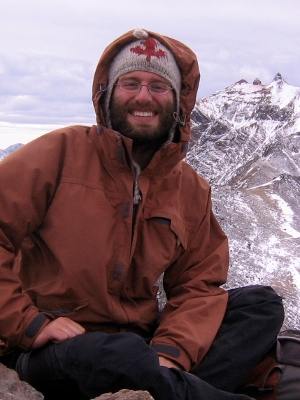Past NIMBioS Postdoctoral Fellow
Will Godsoe
 Dates: September 2009 – September 2011
Dates: September 2009 – September 2011
Project Title: The statistical relationship between a species' niche and its distribution
As a NIMBioS postdoctoral fellow, Will Godsoe (Ph.D. University of Idaho, 2009) examined relationships between a species niche and its spatial distribution. A core problem in ecology is to understand which processes shape species distributions. This topic has become particularly important as many environmental disruptions including climate change, habitat loss and species introductions act by radically altering species distributions. Godsoe used probability theory to formally connect observations of where species actually occur to mathematical understanding of species ecology. Godsoe modeled the relationship between the probability that an environment is suitable and the probability that an organism will actually be present in a given environment. Upon completing his fellowship at NIMBioS, Dr. Godsoe accepted a position as a lecturer in terrestrial ecology in the School of Biological Sciences at the Univ. of Canterbury, New Zealand.
NIMBioS Seminar: I can't define the niche but I know it when I see it: using probability theory to understand species distributions
Feature Stories:
Scientist ties distribution modeling to ecological theory
The puzzle of biological diversity
Species distribution models can exaggerate differences in environmental requirements
Video Interview: Niche and distribution
Publications while at NIMBioS
Bewick S, Chisholm RA, Akcay E, Godsoe W. 2014. A stochastic biodiversity model with overlapping niche structure. Theoretical Ecology. [Online]
Godsoe W. 2014. Inferring the similarity of species distributions using Species' Distribution Models. Ecography, 37(2): 130-136. [Online]
Godsoe W, Larson MA, Glennon KL, Segraves KA. 2013. Polyploidization in Heuchera cylindrica (Saxifragaceae) did not result in a shift in climatic requirements. American Journal of Botany (in press). [Online]
Beckage B, Gross L, Platt W, Godsoe W, Simberloff D. 2012. Individual variation and weak neutrality as determinants of forest diversity. Frontiers of Biogeography, 3(4): 145-155.
Godsoe W. 2012. Are comparisons of species distribution models biased? Are they biologically meaningful? Ecography, 35(9): 769-779. [Online]
Godsoe W, Harmon LJ. 2012. How do species interactions affect species distribution models? Ecography, 35(9): 811-820. [Online]
Simmerman S, Wang J, Osborne J, Shook K, Huang J, Godsoe W, Simons T. 2012. Exploring similarities among many species distributions. SCEDE12: Extreme Science and Engineering Discovery Environment (peer reviewed paper at high performance computing conference). [Online]
Smith CL, Tank S, Godsoe W, Levenick J, Strand E, Esque T, Pellmyr O. 2011. Comparative phylogeography of a coevolved community: Concerted population expansions in Joshua trees and four Yucca moths. PLoS ONE, 6(10): e25628. [Online]
Beckage B, Godsoe W, Gross L, Platt W, Simberloff D. 2010. Individual variation slows competitive exclusion. Science, e-letter published online 14 July 2010. [Online]
Presentations while at NIMBioS
Bewick SA, Chisholm RA, Akcay E, Godsoe W. October 2011. Tropical biodiversity: New models for an old problem. Society for Advancement of Chicanos and Native Americans in Science, Modern Mathematics Workshop, San Jose, CA.
Bewick SA, Chisholm RA, Akcay E, Godsoe W. August 2011. 'Neutral' models with overlapping niches. The 2011 Annual Meeting of the Ecological Society of America, Austin, TX.
Godsoe W. May 2011. Does adaptation to early winter freezing contribute to insect outbreaks? Annual Meeting of the Canadian Society for Ecology and Evolution (CSEE), Banff, Alberta, Canada.
Heard S, Godsoe W, Timmons S. May 2010. Exploitation of host plant morphospace by generalist and specialist phytophagous insects. Annual Meeting of the Canadian Society for Ecology and Evolution (CSEE), Quebec, Canada
Media Coverage
Species distribution models can exaggerate differences in environmental requirements. EurekeAlert.
Species distribution models can exaggerate differences in environmental requirements.
ScienceDaily.
New findings suggest species' interactions don't always promote diversity. ScienceDaily.
NIMBioS
1122 Volunteer Blvd., Suite 106
University of Tennessee
Knoxville,
TN 37996-3410
PH: (865) 974-9334
FAX: (865) 974-9461
Contact NIMBioS


